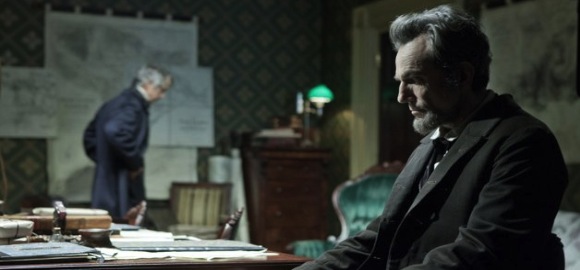Movie Review: Lincoln
Concentrating on the then controversial 13th Amendment, which ultimately ended slavery, this narrow view of Lincoln’s presidency avoids most of the biopic pitfalls and portrays him as more man than myth.
The Civil War has already been waging for years and both sides are hoping for a resolution. While President Lincoln is also keen to end the war as swiftly as possible, he’s more concerned with ending the atrocity of humanity that is slavery, and the main reason the South seceded in the first place. Unfortunately, he doesn’t believe it’s possible to end the practice once the war is finished. For many politicians, and even Union supporting citizens, the only reason they would support such an amendment is because it would mean an end to the war. Of course, it’s still an uphill battle for Lincoln and that is the backdrop in which director Steven Spielberg and writer Tony Kushner (Munich) explore with the 16th President.
In creating such a narrow time frame of Lincoln’s life, it allows Spielberg to portray him in his everyday life, rather than fall in to the cliches many biopics find themselves following. Spielberg’s intentions are to show him as a man and not as the myth he’s become in the century and a half since he died. While he succeeds in creating the rare biopic that feels original, with the aid of Daniel Day-Lewis’s intensely humanizing portrayal of Lincoln, the film does still fall into the trap of praising him rather than merely placing him on screen. However, it’s a minor complaint in an otherwise fantastic film that’s as much about the man as it is the workings of the American government.
In fact, the way the film illustrates how the U.S. government grinds its gears may be the most fascinating aspect. At times it can feel dull, but that’s because Spielberg attempts to let it play out as it actually happened. Of course, he drops in on most of the more exciting debates but what he ultimately manifests is that, for better or worse, politics is a game. And this is exactly what Lincoln understands and what made him one of the greatest American Presidents. He understands that being idealistic can be a great quality, but being unwilling to bend and compromise won’t get him anywhere. His foil in the film is that of Congressman Thaddeus Stevens (Tommy Lee Jones) a bleeding heart abolitionist who will make no compromises for his beliefs. Because of his firm stance he has earned the respect of many but also the abhorrence of a lot. Instead, Lincoln attempts to walk a fine line of playing both sides in order to get what he wants, the abolition of slavery, and what everyone wants, the end of the Civil War.
It’s one of those films that’s stuffed with familiar faces and names. Most importantly, of course, is that of Daniel Day-Lewis who’s outstanding as Lincoln. Not only does he embody his physical presence perfectly, but he plays him as a man with real hopes, desires and fears yet is able to rise above it all for what he believes is right and for what he understands is necessary. While embroiled with the battle of the 13th Amendment, not just from the House of Representatives, but even within his own Cabinet, he’s also dealing with his spark plug of a wife Mary (Sally Field) and a son, Robert (Joseph Gordon-Levitt), who’s resentful that his parents are against his enlisting in the Union army. It’s Field who’s able to match Day-Lewis’ performance with her own as an equally intelligent woman but one who’s riddled with deep depression from the death of their youngest son and is convinced Robert will also die if he enlists. Still, she’s a fiercely sharp woman and Field infuses her with all the complexities she had. Lincoln’s closest ally is his Secretary of State William Seward, played by David Straithairn, acting as another, but more closely aligned, foil for Lincoln. He shares Lincoln’s views on slavery but Straithairn manifests him as more realistic, and therefore, more nervous about the entire ordeal. While he wants the amendment to pass, he’s worried that it will be at the cost of not ending the war as soon as possible. Other familiar faces include John Hawkes, James Spader and Tim Blake Nelson as the leading lobbyists for the amendment; Hal Holbrook as Francis Preston Blair, an influential Republican who aides Lincoln; and Jackie Earle Haley as Alexander H. Stephens, the Vice President of the Confederate States of America.
It’s not the final nail in the coffin of the Lincoln story on screen, but that’s to its advantage. It doesn’t attempt to tell his entire life story, instead it focuses on a major, if not the most important, aspect of his presidency and through it shows how Lincoln lived his day to day life. It’s also a surprising, almost shameful, look at how big an issue slavery was even in the Union, who were mainly fighting the South because of slavery. It’s a realistic portrayal of how the US government works and how complicated it can be. In that sense, it becomes something more than just about Lincoln and a history lesson –if an actually exciting one– about the country.
Rating: 4 out of 5








